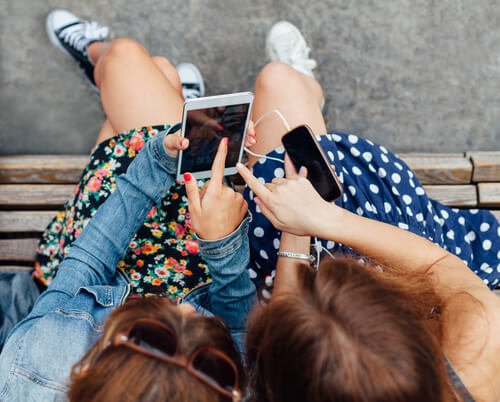Phubbing: A Bad, Modern-Day Habit

We are connected to each other now more than ever. The globalization era has brought forth a level of connection that has never been experienced before. However, this has also triggered many modern-day bad habits, such as Phubbing.
According to Wikipedia, this neologism has been adopted to depict a recurring social phenomenon: the constant need to share everything we think, say or do on social media. This has become a very bad habit.
Many people do this without even knowing it. People are barely aware of their surroundings because they’re too busy reading about what’s going on in some other place or they’re too busy posting about what’s happening in their lives.
What is Phubbing?
This term refers to the act of ignoring the people around you while only focusing on social media through a mobile device.
The term Phubbing was coined in 2007 after smartphones were introduced to the market, to describe the habit of snubbing someone in favor of a cell phone. It’s a combination of snubbing and phone.

Main Reasons for Phubbing
- Little self-control
- Immaturity
- Addiction to technology, mainly cell phones
- Fear (and in many cases, a phobia) of not being connected to the internet and not having a smartphone.
Sadly, Phubbing has become so common that it is rarely noticed or addressed when it is happening.
Phubbing causes people to become oblivious, ignoring the people around them. It also results in getting ignored. In other words, socializing has been affected by the fact that human interaction is mostly taking place online.
Consequences of Phubbing
- Poor relationships with people
- Shallow interactions with people
- Priorities are out of order
- Loss of values
- Short attention span
- Impoliteness
- Detachment
- Antisocial behavior
- Anxiety
It’s disrespectful to interrupt or ignore a conversation by paying more attention to a mobile device. Even if just “for a moment,” or if the person claims to be able to multitask (like engaging in a conversation while looking at your phone).
Technology is obviously a very useful tool, but no one likes to be ignored or feel out of place. Especially due to an electronic device.
What makes a mobile device so addictive?
Mobile device addiction stems from wanting to satisfy an emotional need. A lack of immediate response to our feelings causes a dependency and an extreme attachment to our phones.
Of course, many aren’t addicted to the actual mobile device, but to the sense of relief one experiences when you’re able to get in contact with something or someone who fills your emotional void.

Invest in improving the quality of your life for a more desired emotional well-being.
Tips to avoid Phubbing
- Speak now, type later. Keep in mind that it’s really not necessary to stay connected all the time.
- Pick a day to be phone and internet free. Choose a day to enjoy your surroundings, your home, your family, your kids, and/or your pets without sharing or posting anything on social media.
- Avoid fact-checking every time someone talks to you about an unfamiliar subject. No need to mistrust people so much. It’s good to keep up on current events and check sources but it’s mildly offensive (and unhealthy) to fact-check everything.
- Keep your phone off the table at mealtimes. Enjoy your mealtimes without looking at your phone screen.
- You don’t have to snap a picture of everything. Taking pictures can preserve a memory of an enjoyable moment but we shouldn’t stop living in the moment just to capture the moment. Live more, take fewer pictures.
- Rest your eyes. Electronic devices emit a blue light that affects our vision’s health and it disrupts our nighttime rest.
- Stop using your phone at least 20 minutes before bedtime. It’ll help you sleep better.
We should be mindful of the amount of time we spend on technology and learn to function without it. This will prevent us from becoming unnecessarily dependent on it, making us incapable of operating on our own without it.
On the other hand, being able to put down our phones will ensure we don’t ignore the people around us. Take control over technology, don’t let it control you.
All cited sources were thoroughly reviewed by our team to ensure their quality, reliability, currency, and validity. The bibliography of this article was considered reliable and of academic or scientific accuracy.
- Barrios-Borjas, D. A., Bejar-Ramos, V. A., & Cauchos-Mora, V. S. (2017). Uso excesivo de Smartphones/teléfonos celulares: Phubbing y Nomofobia. Revista chilena de neuro-psiquiatría, 55(3), 205-206. https://scielo.conicyt.cl/scielo.php?pid=S0717-92272017000300205&script=sci_arttext&tlng=en
- Chotpitayasunondh, V., & Douglas, K. M. (2016). How “phubbing” becomes the norm: The antecedents and consequences of snubbing via smartphone. Computers in Human Behavior, 63, 9-18. https://www.sciencedirect.com/science/article/pii/S0747563216303454
- Chotpitayasunondh, V., & Douglas, K. M. (2018). The effects of “phubbing” on social interaction. Journal of Applied Social Psychology, 48(6), 304-316. https://onlinelibrary.wiley.com/doi/abs/10.1111/jasp.12506
- Karadağ, E., Tosuntaş, Ş. B., Erzen, E., Duru, P., Bostan, N., Şahin, B. M., … & Babadağ, B. (2015). Determinants of phubbing, which is the sum of many virtual addictions: A structural equation model. Journal of behavioral addictions, 4(2), 60-74. https://akademiai.com/doi/abs/10.1556/2006.4.2015.005
This text is provided for informational purposes only and does not replace consultation with a professional. If in doubt, consult your specialist.
